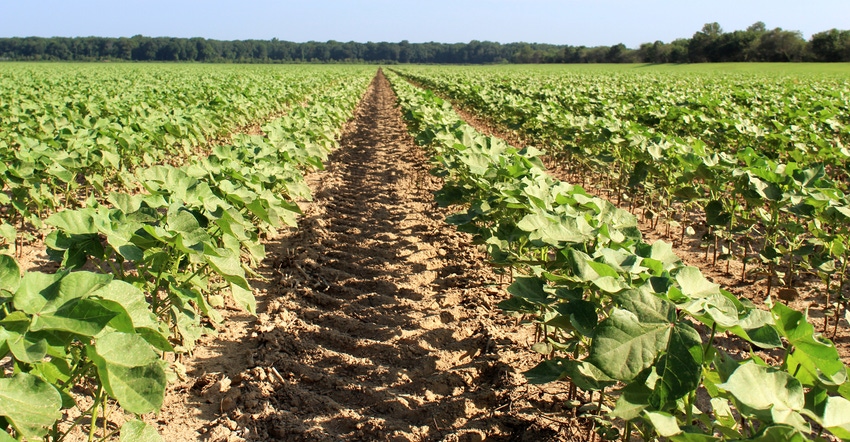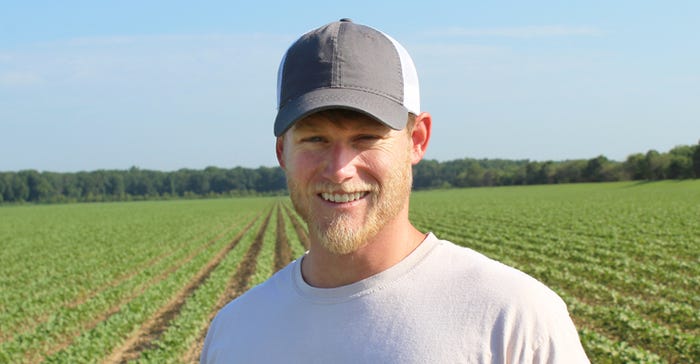January 28, 2020

Sponsored Content
The number-one challenge each season for Barnes Farms, located near Kenton, Tennessee, is resistant Palmer amaranth, commonly known as pigweed. It has plagued Tennessee farmland for more than a decade.
Rance Barnes, Jr. grew up on this farm, located in the Obion River Bottoms, where there are rich Memphis silt loam soils on hilly fields and low-lying, river-bottom fields with streaks of clay-type “gumbo” dirt. Cotton and corn are the primary crops, with soybeans planted on river bottom fields later in the spring due to slow-to-recede floodwater, or behind wheat on the hill ground.
Barnes began using the Roundup Ready® Xtend Crop System in 2016. Today, all of his farm’s cotton and the majority of his soybean acres are planted to the system. While the system has been important to Barnes for improving pigweed management on the farm, a key to helping it work effectively is application timing, he says.
“As long as we are timely with our herbicide applications, the dicamba technology has eliminated the need for us to put out Gramoxone® [SL 2.0 Herbicide] between the rows, or to call in people to hand-pull pigweed,” Barnes said. “We have eliminated at least two herbicide trips through the crop since adopting the Roundup Ready Xtend Crop System. We’ve figured out the quicker you can kill the weeds, the cheaper it will be to control them rest of the season.”

Spraying Early
Barnes burned down his cotton field in early March. His cotton planter was followed up with a residual herbicide and Gramoxone [SL 2.0 Herbicide]. Within 10 to 15 days after the crop emerged, Barnes expected to be in the field again, making the first in-crop dicamba application.
“The most urgent pest to control in our fields is resistant pigweed, so we wanted to be out there spraying about 10 days after emergence,” he said.
Most of his cotton fields required a second dicamba application before rows canopied over. For a lay-by application, Barnes went in with a combination of glyphosate and glufosinate. From burndown to lay-by application, just five herbicide trips were needed to keep his cotton fields clean.
“In the past, you’d get to the point where you didn’t want to spend any more money on weed management and would just let them go,” Barnes recalled. “Now, when I ride around and don’t see pigweed in fields like I used to, that shows me how much the system has meant to the farming community around here. The system is working for us.”
Yield Matters
Getting weed management under control hasn’t come at the expense of yield performance for Barnes. His 1,700 acres of cotton in 2019 were planted to two primary varieties, DP 1518 B2XF and DP 1522 B2XF, which Barnes said have been dependable performers and very adaptable to his soil types.
“Deltapine® cotton with XtendFlex® Technology has definitely helped us out as far as weed control goes, but I think that our yields have improved as well,” Barnes said. “We’ve had some cotton fields in the 3-bale per acre range, or 1,500 pounds per acre. We’ve planted brands other than Deltapine cotton, and Deltapine cotton has always outperformed them by 200 pounds in the same field.”
Prior to 2016, Barnes Farms found weed management laborious and costly. Today, they are not running hoods or chopping cotton, and they are spending less to obtain adequate control while getting high yields from their Deltapine cotton varieties.
“The more pigweeds you have in a field, the less yield that field is going to make,” Barnes said. “I don’t know exactly how much Deltapine varieties with XtendFlex Technology have impacted our bottom line, but I’ve seen them enough to know that’s what we need to plant.”
To see more success stories, visit Deltapine.com.
Monsanto Company is a member of Excellence Through Stewardship® (ETS). Monsanto products are commercialized in accordance with ETS Product Launch Stewardship Guidance, and in compliance with Monsanto’s Policy for Commercialization of Biotechnology-Derived Plant Products in Commodity Crops. This product has been approved for import into key export markets with functioning regulatory systems. Any crop or material produced from this product can only be exported to, or used, processed or sold in countries where all necessary regulatory approvals have been granted. It is a violation of national and international law to move material containing biotech traits across boundaries into nations where import is not permitted. Growers should talk to their grain handler or product purchaser to confirm their buying position for this product.
ALWAYS READ AND FOLLOW PESTICIDE LABEL DIRECTIONS. It is a violation of federal and state law to use any pesticide product other than in accordance with its labeling. NOT ALL formulations of dicamba or glyphosate are approved for in-crop use with cotton with XtendFlex® technology. ONLY USE FORMULATIONS THAT ARE SPECIFICALLY LABELED FOR SUCH USES AND APPROVED FOR SUCH USE IN THE STATE OF APPLICATION. May not be approved in all states. Contact the U.S. EPA and your state pesticide regulatory agency with any questions about the approval status of dicamba herbicide products for in-crop use with cotton with XtendFlex® technology.
Cotton with XtendFlex® Technology contains genes that confer tolerance to glyphosate, dicamba and glufosinate. Glyphosate will kill crops that are not tolerant to glyphosate. Dicamba will kill crops that are not tolerant to dicamba. Glufosinate will kill crops that are not tolerant to glufosinate. Contact your Bayer dealer or refer to the Technology Use Guide for recommended weed control programs.
B.t. products may not yet be registered in all states. Check with your seed brand representative for the registration status in your state.
Performance may vary from location to location and from year to year, as local growing, soil and weather conditions may vary. Growers should evaluate data from multiple locations and years whenever possible and should consider the impacts of these conditions on the grower’s fields.
Insect control technology provided by Vip3A is utilized under license from Syngenta Crop Protection Ag. LibertyLink® and the Water Droplet Design® is a trademark of BASF Corporation. Bayer, Bayer Cross Design, Bollgard II®, Bollgard®, Deltapine®, Gramoxone®, Respect the Refuge and Cotton Design®, Roundup Ready® and XtendFlex® are registered trademarks of Bayer Group. All other trademarks are the property of their respective owners. ©2020 Bayer Group. All rights reserved.
About the Author(s)
You May Also Like




